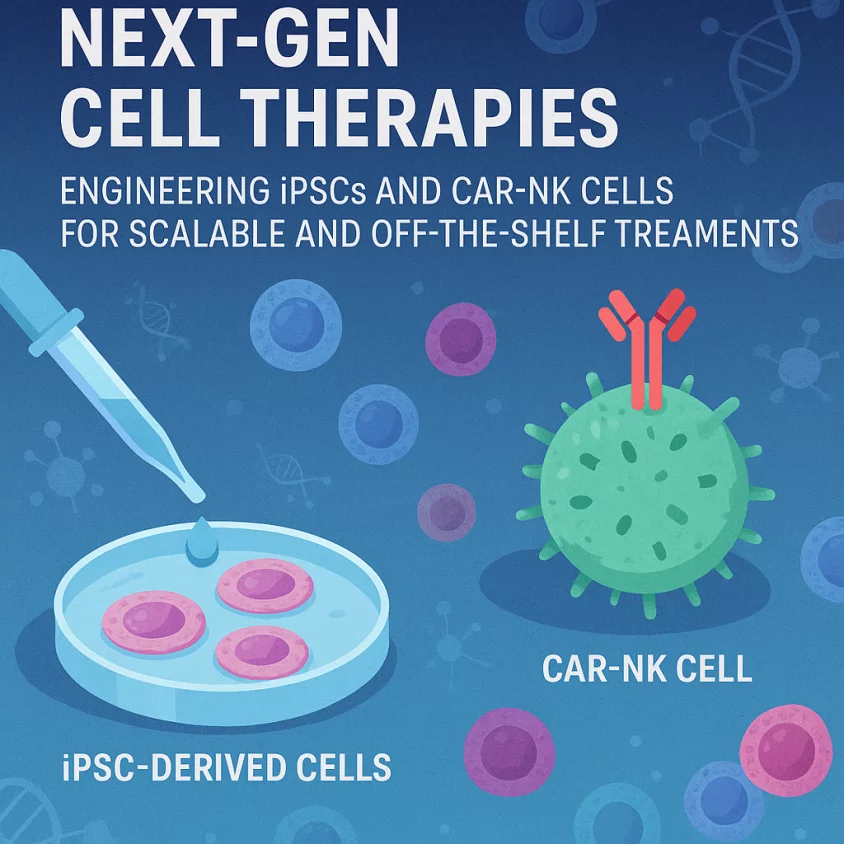Next-Gen Cell Therapies: Engineering iPSCs and CAR-NK Cells for Scalable and Off-the-Shelf Treatments

Introduction: The Evolution of Cell-Based Therapeutics
The biotechnology landscape is undergoing a profound transformation as cell therapies evolve beyond autologous CAR-T treatments. The next frontier lies in universal, scalable, and off-the-shelf solutions, led by induced pluripotent stem cells (iPSCs) and chimeric antigen receptor–natural killer (CAR-NK) cells.
These innovations promise to overcome key limitations of current personalized therapies—namely cost, complexity, time, and safety risks. As research accelerates, next-generation cell therapies are set to redefine standards in oncology, regenerative medicine, and immunotherapy.
1. From Personalized to Universal: Why the Shift Matters
Autologous CAR-T cell therapy has revolutionized hematological cancer treatment. However, this approach presents major drawbacks:
High costs and long production timelines
Logistical hurdles in harvesting and engineering patient cells
Risk of manufacturing failures due to patient variability
To address these limitations, biotech researchers are now focusing on allogeneic (donor-derived) cell therapies. The goal: create "off-the-shelf" cellular products that are readily available, consistent, and affordable.
2. iPSC Technology: The Foundation of Scalable Cell Manufacturing
Induced pluripotent stem cells (iPSCs) are somatic cells that are reprogrammed into a pluripotent state, enabling them to differentiate into virtually any cell type.
Why iPSCs Matter in Cell Therapy:
Unlimited expansion potential, ideal for large-scale manufacturing
Genetic engineering capabilities to enhance safety and functionality
Reduced immunogenicity through genome editing for universal compatibility
Biotech companies like Fate Therapeutics and Century Therapeutics are pioneering platforms that leverage iPSCs to mass-produce therapeutic immune cells, including NK cells, T cells, and even macrophages.
3. CAR-NK Cells: The Safer, Smarter Immune Fighters
Natural killer (NK) cells, part of the innate immune system, have intrinsic anti-tumor activity and do not require prior antigen sensitization. When engineered with CARs (chimeric antigen receptors), they offer several advantages over CAR-T cells:
Benefits of CAR-NK Over CAR-T:
Lower risk of cytokine release syndrome (CRS) and neurotoxicity
No risk of graft-versus-host disease (GvHD)
Shorter lifespan in vivo, reducing long-term complications
Easier to produce from allogeneic donors or iPSC lines
CAR-NK therapies are now in early clinical trials targeting:
Acute myeloid leukemia (AML)
Non-Hodgkin lymphoma
Solid tumors
Several platforms are exploring CRISPR-based editing to enhance CAR-NK functionality and persistence.
4. Applications Beyond Oncology: Regeneration and Infectious Diseases
While cancer remains the primary focus, iPSC- and CAR-NK-based therapies are branching into other areas:
Infectious Disease Therapy:
CAR-NK cells engineered to target HIV- or SARS-CoV-2-infected cells
Broad-spectrum, immune-based antivirals with potential for pandemic preparedness
Regenerative Medicine:
iPSC-derived cardiomyocytes for heart failure
iPSC-derived retinal cells for macular degeneration
Beta-cell replacement in Type 1 diabetes
These applications exemplify the cross-disciplinary potential of next-gen cell therapies, merging synthetic biology, immunology, and tissue engineering.
5. Challenges to Overcome
Despite rapid progress, several technical and regulatory challenges remain:
Genetic stability of iPSC lines over time
Tumorigenicity risks from undifferentiated pluripotent cells
Delivery and engraftment efficiency
Complex manufacturing and quality control in large-scale production
International consortia and regulatory agencies are actively developing new guidelines and standards for these novel modalities to ensure safety and scalability.
Conclusion: A Paradigm Shift in Cell Therapy Is Underway
The emergence of iPSC-derived and CAR-NK-based therapies marks a significant leap toward universal, safe, and accessible cell-based medicines. These technologies promise not only to democratize advanced therapies but also to usher in a new era of modular, programmable cell therapy platforms.
At BOLG, we’re committed to equipping the next generation of scientists and biotech professionals with the tools to lead this revolution.
💡 Explore our advanced learning materials—because the future of medicine is cellular, and your journey starts here.
Step into the future of regenerative biotechnology with BOLG—and unlock your potential today!